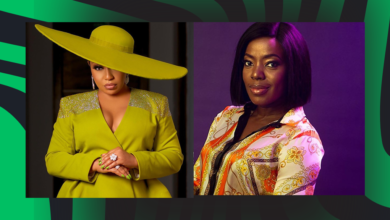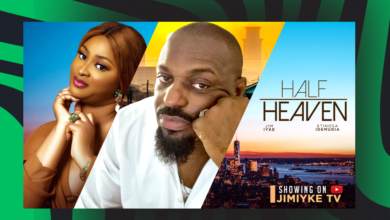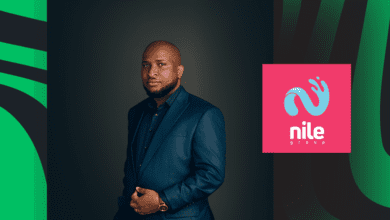The Story ⚡
This is the exclusive story of Tunde Aladese, Nigeria’s screenwriter prodigy now living in Berlin and how she landed a writing gig for a global Netflix show.
In this piece, she talks about her craft, her first time in a writer’s room and some insider details on how creating a show from one outline to a finished script is done.
Let’s Begin
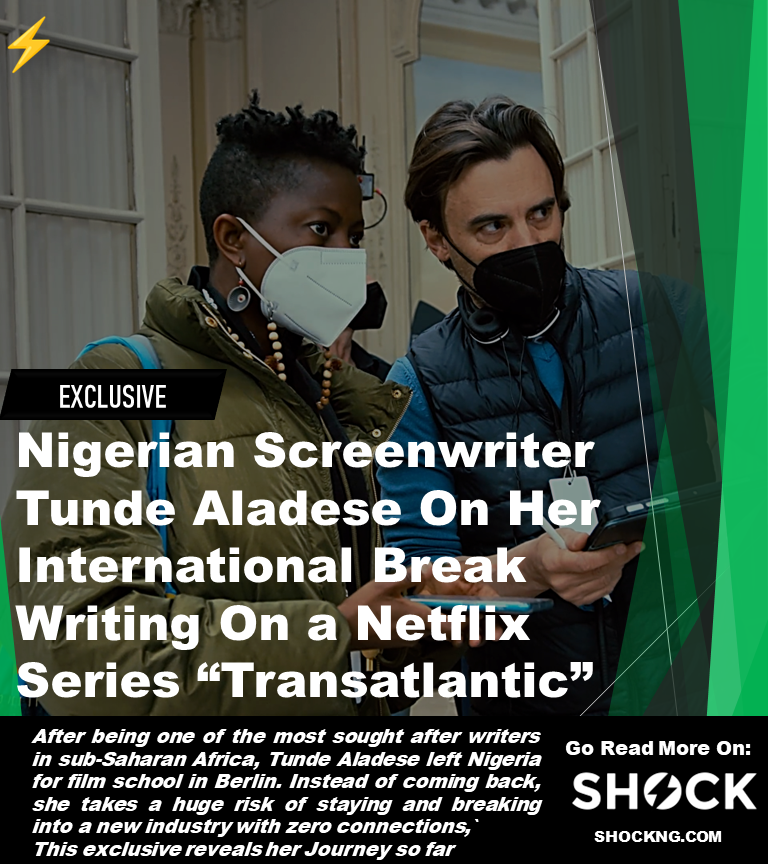

How did you get into a writers’ room on a global Netflix show?
The showrunner for Transatlantic is Anna Winger, an American woman who lives in Berlin and therefore runs her writers’ rooms in English, hiring first-language English speakers.
I became aware of her, and the possible language advantage this gave me, when a writer who’d worked on the second season of her first TV series Deutschland, spoke to my class during my second year in Berlin. That was the first time I considered that it might be possible to get jobs if i stayed in Berlin after graduation without having to become completely fluent in a second language that I still barely spoke at the time. I thought meeting with her would be a good way to get an opportunity and get some ‘Germany-based experience under my belt despite my language limitations, even if just as an assistant. I tried different angles to break into the industry after my studies, get experience, get contacts: I worked as a runner on a couple of projects. Was part of a team on a writers’ room development programme funded by the German American Instistute (DAI), pitched a web series idea inspired by some personal experiences at a German series festival. I even cold-messaged Anna on Linkedin pitching myself for as a potential writers’ room assistant, and of course got no response.
But the ultimate break came from a friend I knew through a networking group, at about the same time that I took a job as an English teacher at a kindergarten to secure my visa and keep my rent paid. That friend, Alex, was working for Anna on a series.
In 2019, Alex told me that Taiye Selasi, while meeting with Anna, expressed some concern about finding writers in Europe who had lived in West Africa for a project set in Ghana. Alex mentioned my name and asked me to send a sample for her to forward to Anna and Taiye.
A few months later, during the Berlin Film Festival, I attended a panel Anna spoke on. Afterwards I introduced myself to her as the person whose sample she hopefully remembered reading. It turned out, her parents met in Nigeria as anthropologists/academics in the 60s and moved to Kenya during the build-up of tensions that led to the Nigerian civil war. She had an emotional connection to Nigeria and asked about my life there and my past work. So where I thought I’d just introduce myself and hurry off before I became a bother, we ended up chatting for a few minutes and she reassured me that I might not hear anything new for a while regarding that project, and not to assume that meant bad news.
A year after this, Alex then tells me about an open assistant role with Anna for a specific project that had a lot to do with the political landscape in Africa. We had one interview via Zoom and after a couple of months, a coffee meet. At the meeting, she told me she considered me overqualified for the position and instead offered me a role as a writer. That was the summer of 2020.
From then on she began setting up opportunities for me to meet with people who she thought might be looking for experienced English-speaking writers. A year after this, she told me she had concluded her Netflix deal and was about to go into the writer’s room phase for her next project. She sent me the pilot to read and let her know if I was interested.
That pilot was Transatlantic.
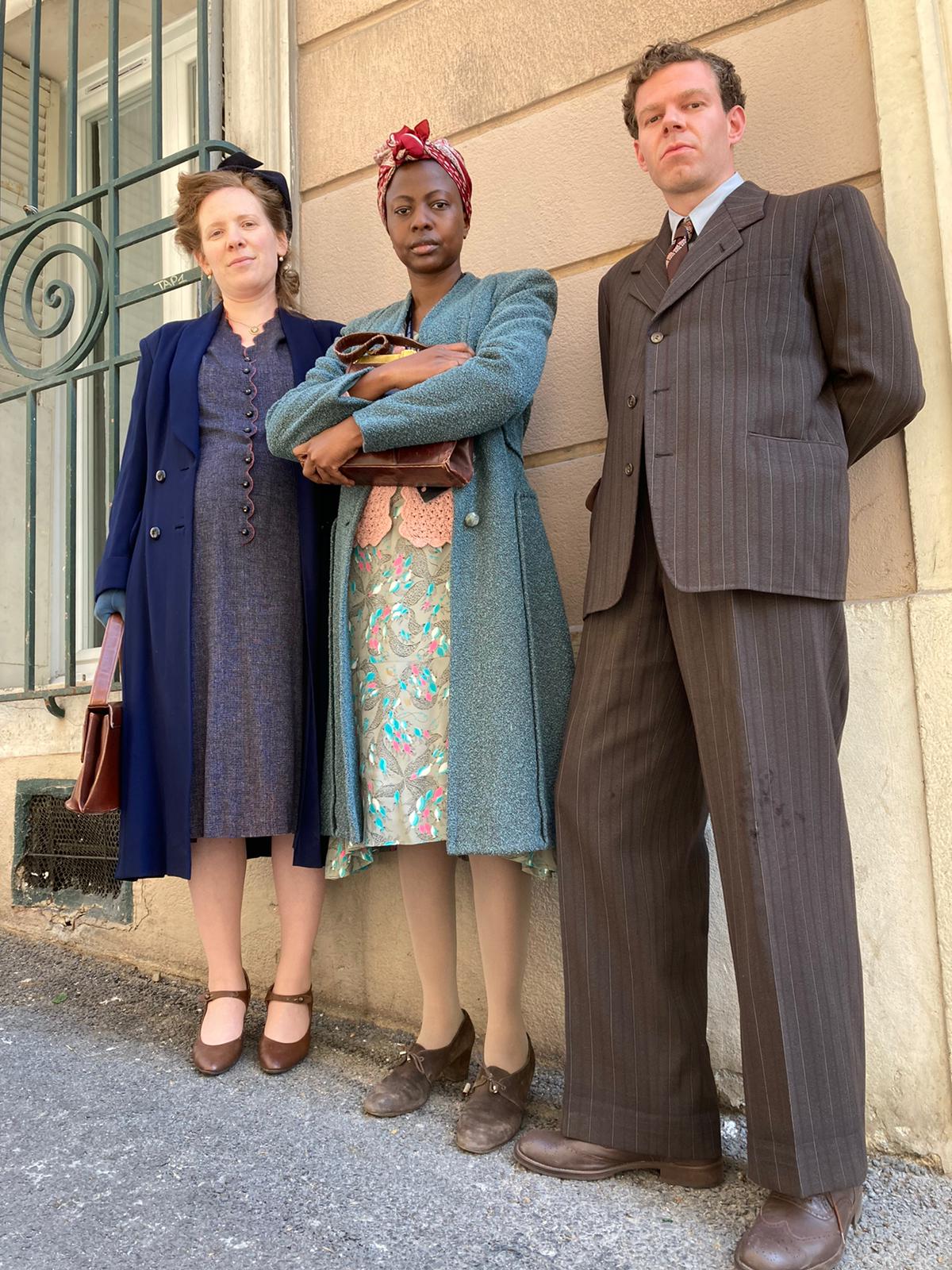

Let’s talk about breaking in and getting visibility, what is the one thing that has helped you along the way?
To be absolutely honest, I think my years of working in Nigeria were invaluable in building up my experience, my skillset, my ability to work under pressure in a way that have been serving me now that I started trying to go for these other opportunities. I also think I was lucky because, as mentioned earlier, I tried a lot of different avenues that either didn’t lead anywhere, or led somewhere but not to actual proper jobs. And it is true that for most people, if you tell them you have a ton of experience in Nigeria, it doesn’t really count, because they don’t know the industry, or what they do know doesn’t count in our favour. Anna was this one person who took me at my word when I told her what I could do, and gave me an amazing opportunity.
While working in Nigeria, I wrote on Edge of Paradise, Tinsel, and Hotel Majestic. The first writers’ room I got in was when I was 21/22 years old. By 29 I was head writer for Tinsel. I often met people who assumed that a soap writer is a bad writer, but you learn a lot writing soap. About working under pressure, delivering on intense schedules all year round. About making people feel, and following people’s emotional responses to your stories in real time.
About the symbiotic relationship between the writers and the cast and crew, how the inspiration flows back and forth, and between everyone’s contributions, you make something richer and more layered. About pitching, about dealing with production and learning not to take feedback personally. About how to keep a show on the air after the entire studio burns down. How to write within a team. How to lead a team. We all learned so much working on those shows. On the first writers’ room for Edge of Paradise,Femi Kayode challenged us to write our first drafts in 24 hours. I scoffed.
But when I realised he was serious, I felt challenged. Of course, it wasn’t a great draft, but it was something I didn’t think was doable until I had been challenged to do it, which was his point. You get through something like that, you kind of stop being scared of deadlines and writers’ block. Now I love a deadline, I need the structure.
On the second season of Tinsel, going into each workshop, IK and I would go into each workshop with this sense of despair that we had no ideas to pitch, no idea where to take these characters next. And by the end of the workshop we would have these crazy, fun stories that we were excited about.
By Season 4, I no longer had that fear. As long as I knew the characters, and found them interesting, I had learned a lot of skills for figuring out ways to put those characters in situations that would have them react in new and interesting ways without betraying the audience.
I’m not saying the work was flawless. To be honest, I’m a little horrified now thinking of myself at that age and the things I thought I knew so much about. But that’s how you learn, you make the mistakes. And if you work with the right people, you learn that the job can also be fun. I think we had a lot of fun on those shows, and I think that fun transmitted to the audience.
Just after film school, I became the head writer on Ajoche. I worked on Shuga Naija season 1 while in Nigeria, and served as Head writer on season 3 while in film school, juggling both that and Jemeji to cover the expenses for my second year in Berlin, all while attending classes four or five days a week.
After going through situations where you had to work constantly under pressure, when you begin working in a space where you can take more time to perfect your craft, it feels like you can do it in your sleep, and then you actually put out better work.
Let’s talk about your writing experience in Transatlantic, were there major similarities and differences you observed in how things are run with Anna as the showrunner of a Naija telenovela and Netflix
With Ajoche and other Mnet/Africa Magic shows, there was a system we’d been using since Tinsel, reporting to the Channel who were training us in something similar to that American system of writing, where you pitch and plot within teams, but the head writer has a rewrite veto.
We had workshops three times a year, for 1 – 3 weeks. In the workshop, we would spend the first few days discussing the last story arcs, and pitching new stories for the next arcs. We talked about performances, storylines, logistical issues, what needed to change, what exciting new things we had the opportunity to introduce, basically taking stock of what we had done and where we wanted to go moving forward.
Every showrunner is different. Anna, for example, doesn’t like long days sitting in front of a board until you’ve figured out every single thing, she doesn’t consider it productive. I would say she prefers 3 to 5 hours of focused work, sometimes structured around a long team lunch, and then you can figure out the details later on your own time. On Transatlantic, we were writing in 2021 spring/summer, COVID-19 was still a thing. So we didn’t have the writers’ room in person, we had to do it via Zoom.
We had a bunch of books to read beforehand, like the novel the series is based on. A lot of historical non-fiction books on the people featured in the show, some biographies and memoirs. It was a lot of reading.
The first two weeks on Zoom were for talking about the general series and characters, and breaking the story per episode, one episode per day. There was already a pilot and series document. So day by day we’d discuss each episode and revisit the story to make it stronger.
Then we took a two-week break to create a first draft of the episode outline, which was sent to Anna and Daniel, and then they sent us feedback after a week or two. Then we had another two weeks on Zoom when we read each other’s outlines. We gave each other feedback and also found ways to play off each other’s episodes. I think we had one month to write the first draft and 2 or 3 weeks to write the second?
During the writing process, were you able to take a step back from the fast-paced nature you’ve become used to?
I was nervous actually, it was my first time writing something that wasn’t Nigerian and wasn’t my own original story. So I allowed myself to wallow in a few days of imposter syndrome. The pilot was so strong, the voice of the show so clear and I was asking if what I had would meet the tone and style of the pilot and the creators’ vision.
There were a few days where I sat in front of my computer trying to come up with the perfect opening, plotting my episode with cards on my living room floor. It was a slow start while I built my confidence and found my voice in the episode. It’s always a little difficult with new characters who haven’t been cast, you’re trying to find their voice in a vacuum, and make sure all the characters in your script don’t basically sound like the same person, that person being you.
Historically, I would handle that by connecting the character to someone I knew in real life, or a combination of people. With Transatlantic, I found a way in by deciding to write one of the main characters (eventually played by Gillian Jacobs) as Tracy Lord from Philadelphia Story dropped into the world of Casablanca and that helped me along until I hit a peak and the pages began to fly by. This reference was not exactly accurate, of course, but the same way that you use references in a pitch to give people a ballpark sense of the voice of a new series or a film, telling myself that helped situate me a little bit so I could finally start writing and feel like I knew where I was going.
And then the notes started to come in and I could polish and tweak to fit better with what the creators wanted. For example, I think Anna’s dialogue was crisper where I can sometimes be a little lyrical and indulgent, especially in a first draft. So I had to follow her cue and pare that back. And by the time we cast, it became that much easier to write or adjust to the cadence of the actor. But getting some really great feedback on the first couple of drafts really helped boost my confidence and reassure me that maybe I wasn’t a complete charlatan.
How many writers were in the writers’ room, and in terms of getting feedback, was it done on a one-on-one basis or as a group?
We had 6 writers in the writers’ room, and a few assistants to deal with office logistic and research. For the feedback sessions, we had full rooms for everyone to give feedback on the outlines, full rooms to give more sparing, measured feedback on the first drafts. And after that stage, feedback became a one-on-one thing. Each of us in a separate scheduled zoom with Anna and Daniel, and also getting notes via email within our scripts.
Let’s talk about the story of Transatlantic, what was something you found interesting when you read the fictional material and when you read the final draft for the fiction
I read the pilot before I read the background material, and I found it exciting. I thought it had a lot of great moments, great humour. There was a moment within the first 10 pages of the script that made me laugh while I read it, and think – ‘OK, this isn’t just a great opportunity. This is going to be fun.’ And I’m someone who fell in love with the idea of Hollywood, of a magical place where movies and dreams were made, and how it began and the first 40 years of film, before I was old enough to fully grasp a lot of the technicalities and realities of making a film.
So I quickly recognised what the pilot was going for stylistically and that really excited me. That screwball element, that ‘hijinks ensue’ vibe, it was like an opportunity to relive my childhood dream.
It’s the story of the refugee crisis in Marseille in 1941 when all these Jews and artists and intellectuals were fleeing the Nazis and trying to get out of Europe. What was unique about this time, from some of the material we read, was that it wasn’t all sad and bleak. Yes, people were scared but they were also in a way living in a heightened manner. Indulging in love affairs, engaging in dangerous activities. Some of our artists were choosing to live intensely, like there was no tomorrow, some preferred to bury their heads in the sand. It’s like Fela said: ‘why I dey laugh, because I no fit cry’.
I think a lot of Nigerian humour is quite dark, situated within quite dismal and terrible situations, so I felt at home with that. There’s a certain attitude of “the world is falling apart, there’s nothing we can do so let’s just dance and sing”. It’s a way to release the pressure, feel alive and forget that thing that keeps you awake at night. But the same way that, when you’re a kid in primary school and you get picked up a little late, and it’s exciting at first to get to spend a little longer playing with your friends, the excitement starts to fade and despair begins to set in as everyone else gets picked up, and you realise soon you could be the only one left.
The reality of your situation starts to dawn on you. In that way, our story starts off feeling like a thrilling adventure for many of our characters, but steadily as the story progresses, the danger and disquiet grow.
It was interesting to read about the concept of celebrity back then, the feuds that weren’t so different from today’s twitter wars, the way these people behaved and how ill-equipped so many of them were to save themselves. A large chunk of the story, both in real life and in the series, has a lot of our heroes and our artists, living together in a house while waiting for the opportunity to escape. I was fascinated by the idea of some of the most famous artists and intellectuals of the time, basically living in the house, living out of suitcases or with just the clothes on their backs, with not much food and plenty of wine, finding strange ways to entertain themselves.
It was like a hippie commune with danger hanging over their heads and I’ve definitely heard people from other parts of the world who have gone through similar crisis situations talk about similar feelings and experiences – the awareness that despite unspeakable cruelty, people are still human and caught up in everyday human concerns and endeavours, the minutiae, not just in the tragedy of their world and circumstance.
The story is a mix of very serious, life-threatening issues and also what it means to be alive. I think we made a show that tells an important story, but not necessarily in the way people would expect this subject matter to be handled. It’s a series that shows how much we love storytelling and creativity, and its importance to the human spirit. it doesn’t necessarily have the usual dramatic thrust of the typical, big-binge series, we have a lot of quirky elements.
We tried to channel the spirit of the people we were writing about, so we embraced the surreal every now and then. It has heart, humour, humanity. It has love and heartbreak. It starts with a light touch and steadily gets more intense and emotional, much like the experiences of many of the people we read about.
It was also interesting to read specifically about some of the people who inspired our ‘Paul’ character: Africans who had been involved in the Resistance fight in Europe back then. Like the Nigerian jazz musician, August Agbola Brown, who’d been in poland when the Nazis invaded, and fought against the Nazis. And about Leopold Sedar Senghor, a major theoretician of Negritude and eventual first president of independent Senegal. He was enlisted in the French army when the Nazis invaded, and stayed on after France laid down arms, interred by the Germans, released for medical reasons and involved in the Resistance after that.
And we were also inspired by the writings of Aimé Cesaire, originally from Martinique, who wasn’t in Europe at the time of our story, but connected with some of our characters – such as Andre Breton – both before the war and later when some of the refugees stopped in Martinique after fleeing Europe. Cesaire considered himself of Igbo descent, was one of the founders of the Negritude movement and wrote about the cultural identity of the African within the colonial context. We took pieces from all these fascinating men for Paul.
What does this opportunity mean for you and how does this play a huge role in your career
It’s a huge opportunity, it’s potentially a game-changer for me, there’s no denying that. But that’s also not certain, this industry can be quite uncertain so I don’t want to say anything about anything that isn’t yet irrevocably official. I believe things are really promising. One of the things I realized is that firstly, experience helps in terms of being able to do the job in a satisfactory manner so when people see your experience play out, ideally they acknowledge your skillset and give you more opportunities.
Also, people are more likely to give you an opportunity if they see that someone else has given you an opportunity. Since getting to write on Transatlantic, there’ve been more meetings, more conversations, and more opportunities.
I think we made a great show and hopefully I get the chance to work on more great shows, and to create some myself.
There’s a project that I’m currently in discussion with Studio Airlift (producer of Transatlantic) about. We’re talking about developing it in our way and then seeing if someone believes in it enough to support it financially. I might also get the chance to write on some of Airlift’s next projects, fingers crossed.
And there’ve been a few other opportunities. A project I heard about through Kenneth Gyang, which needed a Nigerian writer to add to their team, and realised some of the key figures on the project had the same agent as me, I was able to pitch myself to that team from two angles, and get into that room. My agent knew about that project, but as far as he knew, they were writing in German, which counted me out. But now I had information that allowed him to pitch me to them in spite of the language challenge, and with them hearing about me from two different sources, I was able to get into that room.
Since then, I’ve had a good relationship with the team working on the project. The production company recommended me for the workshop I’m in Greece for right now, the same one I was in France for a couple of months ago.
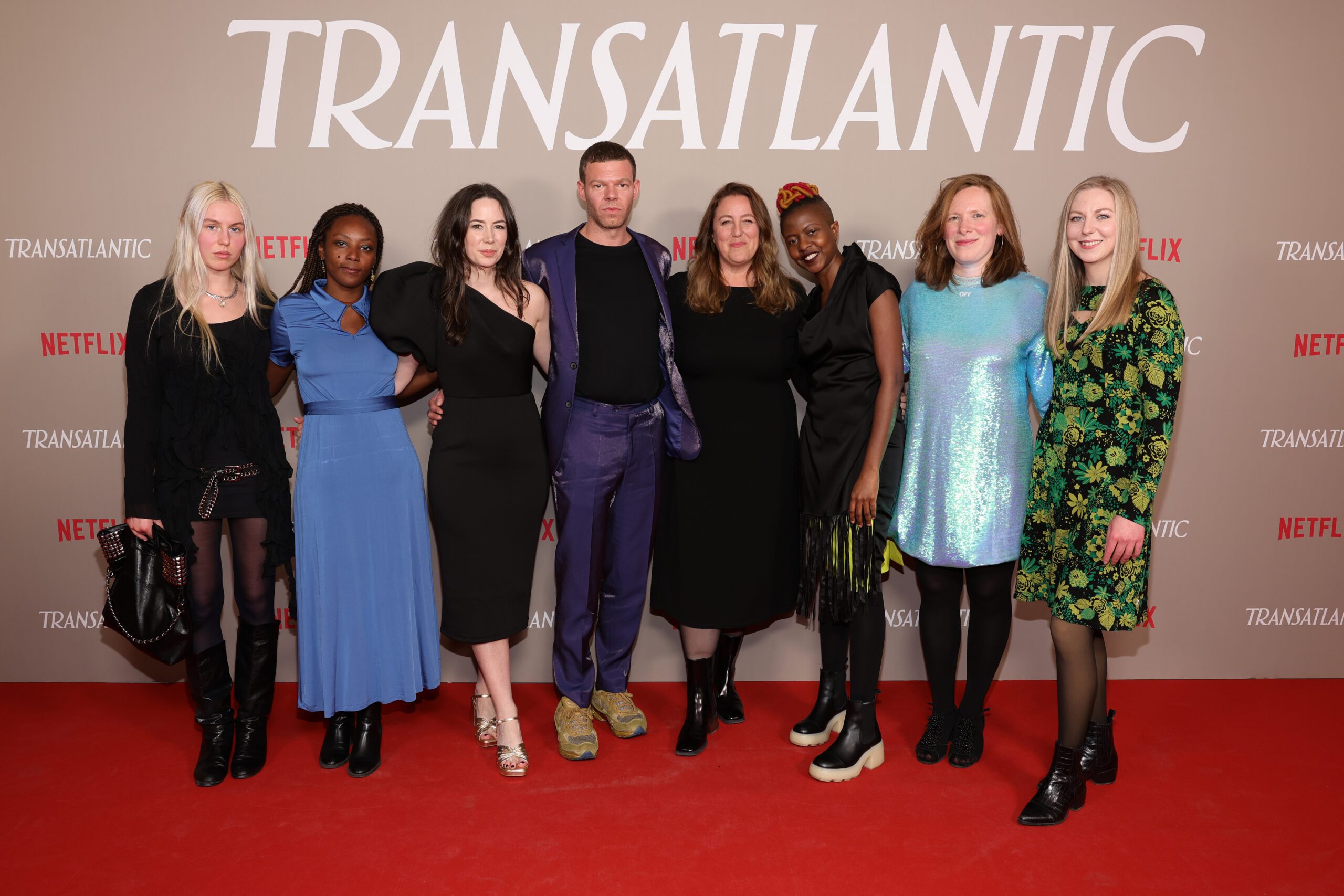

In terms of creating worlds and characters at such a young age, how did it shape your dealing with deliverables? How was it for you starting out as a writer professionally?
I think I was lucky. I think the timing was great for me. I graduated from UI in 2000. In my first job, I was the only employee of a radio programme production company, my boss had all the show ideas I’d come up with in a file.
When Akim Mogaji came from the UK to Lagos to develop a radio drama series for BBC Africa, my boss showed him all the stuff I’d been writing. The man was impressed and invited me to join the writers’ room for his series ‘Story Story’. I was 21. I didn’t know what a writers’ room or writer’s workshop was. I worked on that project for the three days they spent discussing the pilot, which was an eye-opener for me. At the end of it all, I was handed an envelope that contained an amount equivalent to about half of my salary for my regular job at the time.
I didn’t realize one could make that kind of money for what I basically did for fun anyway. From then on, I became focused on figuring out how to do this for a living. And the reason i say the timing was great, is that within the next 5 years or so from that time, there were multiple instances of these foreign organisations starting to put money into Nigerian series which they wanted written by teams of writers. And because they couldn’t find a lot of people who’d done that for many years, a lot of newbies like me got our chance to jump in early and learn while we were still hungry enough to deal with the intense pressure that would come.
It took a few years before I could say ‘this is what I’m focused on for a living, this is how I make my living’. ‘I’d worked on the second season of Story Story. I worked on an NGO drama series called The Station, which was the first TV show I worked on.
I had my proper hustle phase when I had to bike my way all over Lagos to have meetings with every random person who thought they could be a producer. And I supplemented my income writing advertising copy freelance, doing interviews and human interest stories for a women’s magazine. Nonetheless, there was a lot of good stuff that happened.
After the NGO drama series, I got recommended for Edge of Paradise. IK Umeadi and I both worked on the first two seasons of Edge of Paradise. Femi Kayode, who was the creator and head writer of Edge of Paradise, gave us the heads up that Mnet was about to start making soaps and Telenovelas, which could be our way of making a regular living as TV writers.
That excited us and as soon as we heard 341 Media and Yinka Ogun’s Tinsel had won the pitch, IK and I immediately researched their office address, went there with our writing samples from Edge of Paradise and our CVs. We had written for Mnet before so that probably gave us an advantage and we got the gig.
We worked on Tinsel seasons one and two. I’d met Kemi Adesoye and Yinka Ogun on Edge of Paradise, but Tinsel is where we met and first worked with Victor Sanchez Aghahowa, who soon became one of the directors of the series in addition to being on the writing team. On season two, Kemi Adesoye became the head writer and IK became the script editor.
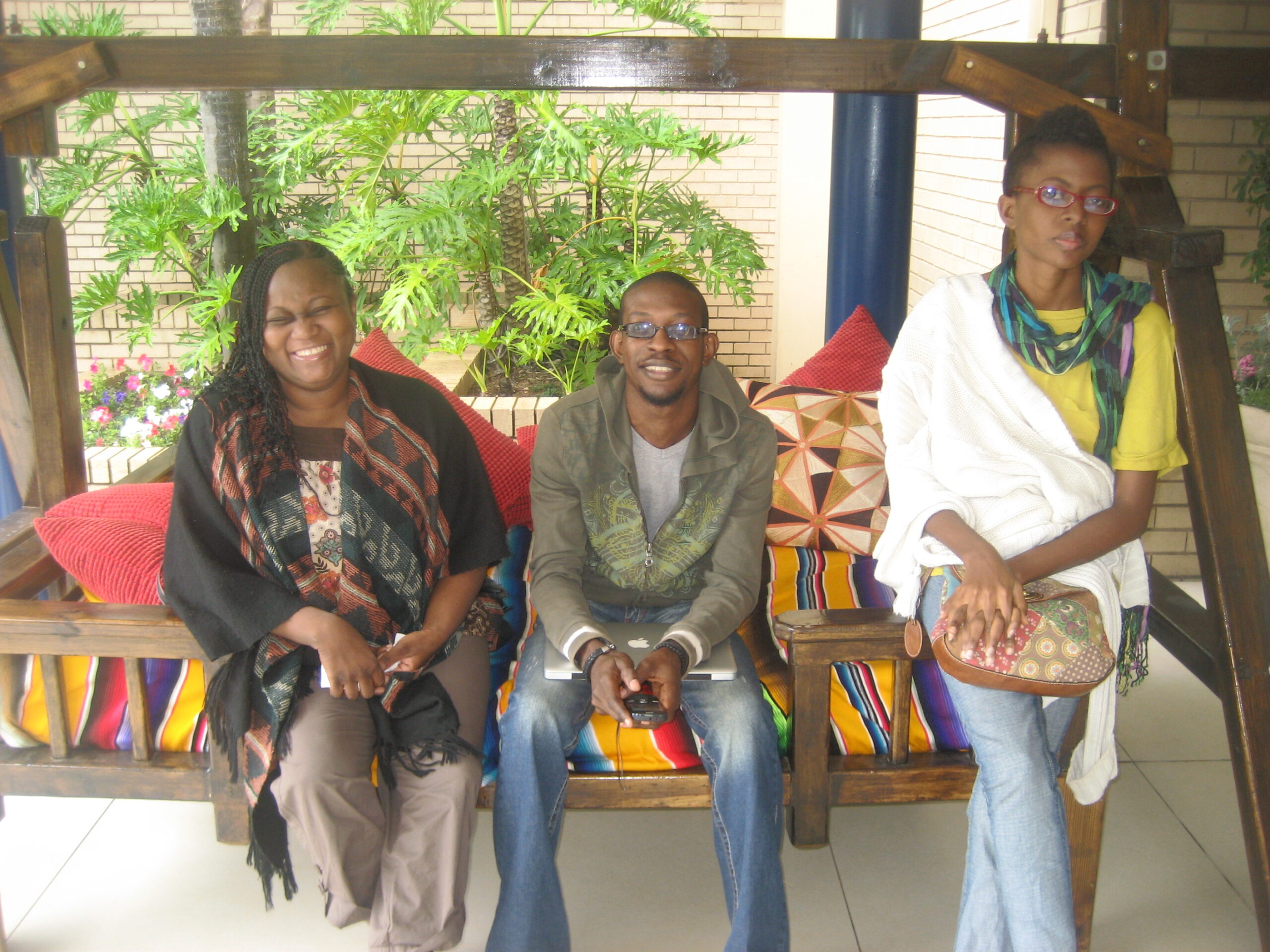

And at some point, I was asked to do episode synopses to send to the channel for screen blurbs, and that put me in a situation where I started noticing some of our continuity drops, so I started communicating with the head writer and script editor on that.
And then at the beginning of the third season, which I think was the season we went a full 260 episodes a year for the first time, Ike became the head writer but ended up not staying in that role for long because he was moving his family to the US. And at that time, the producers weren’t comfortable with the head writer of a continuing soap living outside the country, so I continued being the script editor while also taking on the role of head writer.
It was very much a case of hitting the ground running. It was a very intense time, though exciting. In a way, it was quite freeing and exciting to be in charge and to try some things I’d been wanting to try on the show. And over time, I think within my first season or so, we built a relationship of trust with the channel. The fan base and viewership were growing, and they were able to track that, which allowed them to give us more room and support, to trust our instincts as a team. The more they felt like the formula was working, the more room they gave us.
But it felt really overwhelming sometimes, especially in those first couple of years. I distinctly remember that in my first year as Head Writer, I would sometimes wake up with a start in the middle of the night with this panic that I was never going to get far enough ahead. Because you were always trying to get far enough ahead of production to create a buffer between where the scripts were and where production was and what was airing.
And just when you would think you were getting ahead, something would happen, whether with an actor needing personal time after you’ve written an entire storyline of 80 episodes around them and then you have to go back and rewrite 40 of those episodes and take them out. Or an issue with a location or a set, something that required going back to revisit scripts which you thought were already set.
From Tinsel onwards, I basically was primarily working for Africa Magic/Mnet. I made the time to work on Shuga because I’d been so excited by that first Kenyan season with Lupita and was eager to work on something like that. But outside of a couple of things I did here and there, I mostly worked on those Mnet shows for the next few years. There wasn’t really time to do much else. By then, this was the gig.
And so when you have the gig settled, you’re not really going around doing much networking and hustling and trying to meet people and make contacts. Which probably spoiled me a little bit and stopped me from learning of the political handling of the workspace that most people are familiar with by the time they hit their thirties. I had to relearn networking in a new country with language barriers.
The writer in me likes to be the observer rather than the observed. And I feel like the more of a recognisable face you are, the more difficult it becomes for you to go to places where you want to watch people and be inspired by humanity and character and all that if you are the one everybody’s looking at.
And so I’ve really resisted it for a long time. I’m trying to learn to do things differently, but there’s a part of me that is still resistant to it. But I accept that it’s not necessarily realistic. I’m just trying to temper it, to give a little bit, but not too much.
There was that part of me that by 2014 or 2015 when I was in my 30s was trying to think beyond just sitting and writing scripts and doing nothing further and wanting to take more ownership of my work beyond just writing the script. So that was part of the point of coming to Berlin. Part of it was also just shaking things up. And to be honest, when I came, I thought I was only coming for one year. Here I am, how many years later?
And I ended up on set, getting to watch and participate in the magic coming because the co-creator, Daniel Hendler, who was originally supposed to do that, couldn’t make it. I was called and asked if I’d be interested. For me, this was the perfect opportunity to put all that I’d learned at film school, all the different roles on a set, into practice and watch a story come to life from the script day by day.
Do you think it’s a good thing for Africa Magic to cut down from 260 to 130 episodes considering where the industry is headed in Nigeria?
To be absolutely honest, I don’t think I’m in a position to speak with full authority on this. I have thoughts and suspicions, but nothing that I can say for sure. Victor is at Africa Magic now. I wanted to try and catch up with him when I was in Lagos in November, but we weren’t able to make it work. So I haven’t spoken recently with anyone who could offer authoritative thoughts as to what the current strategy is.
But my experience with Hotel Majestic was that there was one year of general development to pitch. After that, from when we actually started the work of writing Hotel Majestic until we wrapped 260 episodes, I think the core salaried writers were on contract for about 15 months.
Between then and when we did Ajoche, that was already evolving. There was already a sense that the writers would have less and less time to do the work each year. So if there is still that evolving attitude about the writing process and how much time it requires, I don’t know what that means in terms of 130 episodes instead of 260.
At any point in your professional writing career, do you feel that someone has underestimated you and do you know why?
I’m absolutely certain people have underestimated me, and I’m not sure that it’s necessarily a big mystery. I know for a fact that for a large chunk of my career, I’ve often been mistaken for being younger than I am.
From the first time I was a head writer, there have been situations where people would openly say “This small girl, you are the one doing it?” And I also think that I have been the kind of person who likes to sit in the background and let my work speak for me and not necessarily be pushy.
I’m not a quiet person, but I’m very comfortable being quiet. I know that sometimes people interpret that as shyness and then they think as a shy person, you can’t be a team leader. It hasn’t necessarily bothered me, to be honest, as long as it’s not taking a job away from me.
And now that I recall, that first time I was in a writers’ room for Story Story, I wasn’t invited to work on season 1 after those 3 days discussing the pilot, for precisely this reason. The producer told my boss that I had trouble expressing myself. And the way I saw it, I was in a new situation, trying to figure things out, by far the youngest person in that room of about 15 people, some of whom were in their fifties, most of whom had known they were coming for that workshop weeks in advance and had time to prep for it.
I’d woken up that morning not even aware such a thing as a writers’ workshop existed. It made more logical sense to me to take my time observing the situation I found myself in and listening to the people who seemed to be more familiar with it, than jumping right in, throwing my weight (or lack of) around just to prove I know how to express myself.
At the moment, I’m not thinking too deeply about people’s underestimation of me. I’m sure it still happens, they’re maybe just not sharing those opinions so much.
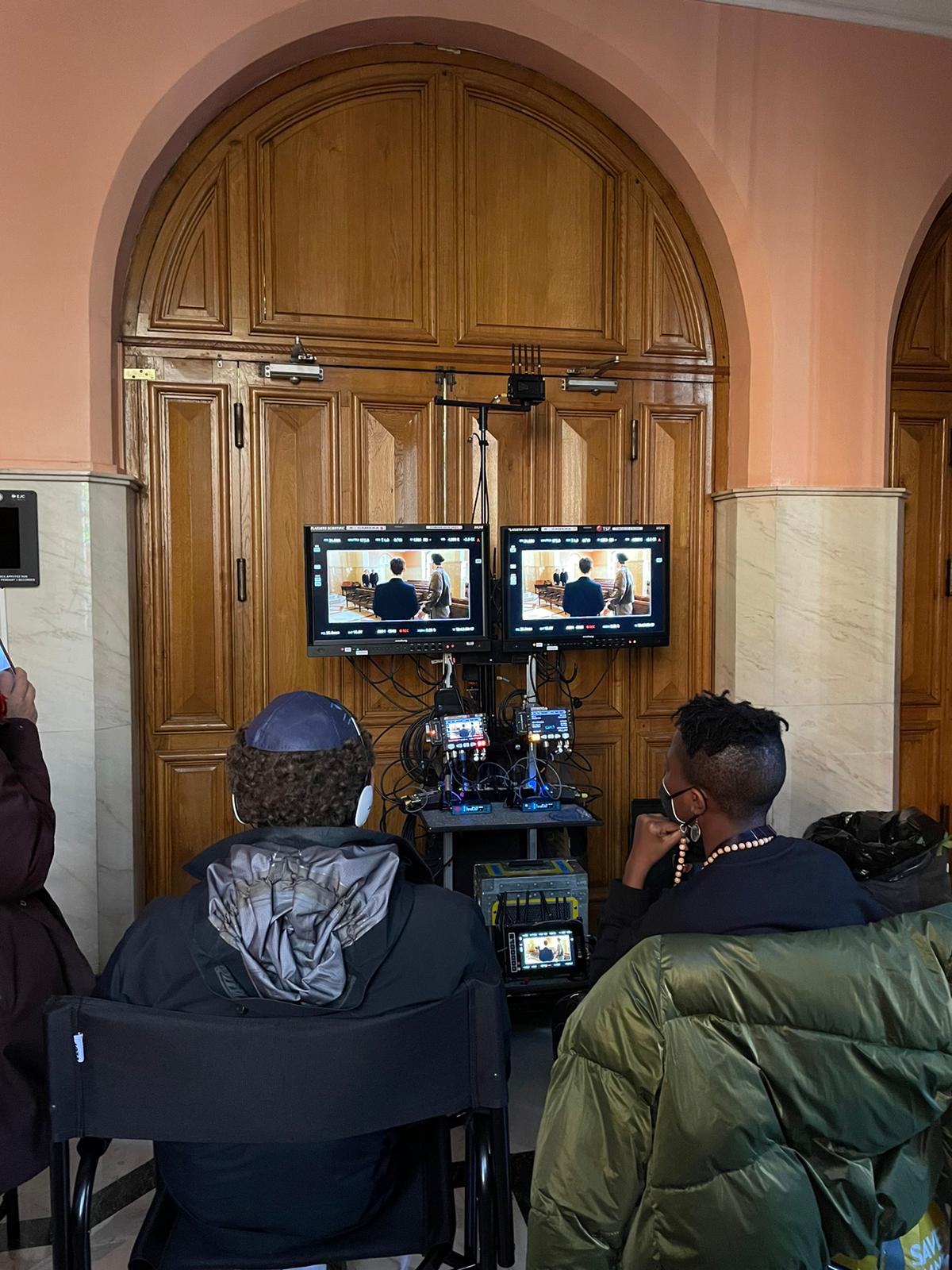

Do you think the industry is ready for global growth?
Honestly, I think it depends on what global growth means. If we’re talking about international companies coming in to Nigeria and take our stories to the world, I’ve always thought we’re great storytellers, it just depends what game plan these people come up with. I think if they want to just jump in and bring 50 shows in one day or in one year, and not pay anyone properly, they will probably struggle. Crew wise. Talent wise. I don’t think it’s impossible. But you get what you pay for.
I think we have talented people in Nigeria but we need training and infrastructural development, and we need to support them in a way that allows them to truly create. Because people were struggling everywhere, not just in Nigeria, with that challenge of assembling teams during ‘the great streaming explosion’.
The way I learned to write for television was almost an apprenticeship system, which I think is the case in most established industries. People learn on the job and rise to higher roles and more responsibility. If you try to do too much too soon in an industry that hasn’t had that level of output at a certain quality, you’ll struggle with putting your team together in a way that doesn’t affect your deliverables.
We experienced a lot of that on Tinsel, a lot of trial and error with finding the people we needed. And I also think that there is a challenge of budget. Sometimes it feels like they hear that Nollywood is high volume, quick turnover and that they, therefore, demand that, but also budget according to that.
I’ve been offered jobs on supposedly international projects with script budgets of a few hundred dollars per episode, with the insistence that they’ve done their research and they know that’s what Nigerian writers make.
And sometimes it feels like rather than make so and so a number of shows with a lower budget, maybe make one show with a better budget and make one really strong show.
Pay everybody properly. Don’t expect Africans to happily work for peanuts, using the excuse of what your research has said is the local standard of living.
What do you think about writers having issues with producers producing something different from what they’ve created?
I don’t know what the answer is beyond what I have been trying to do. Like there was a whole journey from the first couple of things I wrote and feeling disappointed with them to find a sort of uneasy compromise and just try and write the best scripts and put as much information as possible on the page to avoid some level of confusion or disconnect.
And in the early days of Tinsel, we would comfort ourselves whenever we felt our intention had been lost, with the fact that at least it read great on the page. But over time, I think we were starting to find each other. We knew the actors’ voices and started writing towards that, we picked up and followed through on the chemistry we saw on screen.
It started to feel more and more like a team effort. I think there is this general conception that writers are so delicate and precious that they need to be kept away from what happens on set because they would throw tantrums if a single word was changed. Television isn’t like that, it’s supposed to be a communal effort, working with each other to make the end product richer, an ongoing relationship. So contact is often cut off once the script is delivered and then you see strange things on the screen.
And being on the set of Transatlantic during the shoot helped avoid a few similar situations, where you only realise once they begin to block and do the first couple of takes, that three different people have read the same scene in three different ways that totally change the meaning behind it.
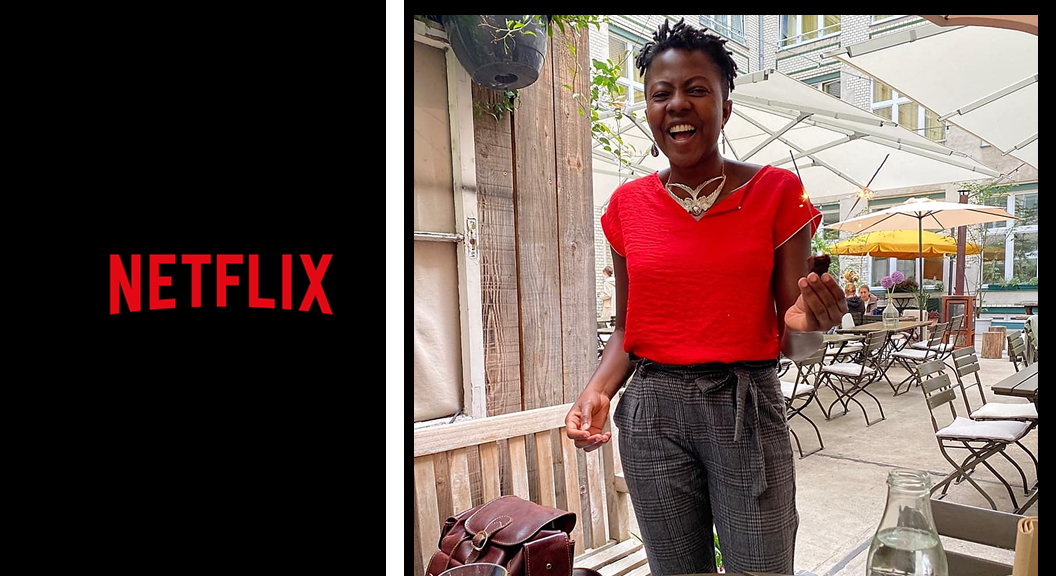

Thanks for Reading.
Shockng.com covers the big creators and players in the African film/TV industry and how they do business.
Let’s be friends on @Instagram
